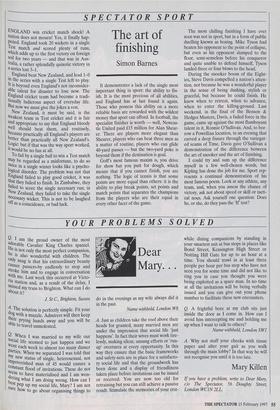SPECTATOR SPORT
The art of finishing
Simon Barnes
ENGLAND win cricket match shock! A nation does not mourn! Yes, it finally hap- pened. England took 20 wickets in a single Test match and scored plenty of runs, which adds up to the first victory on foreign soil for two years — and that was in Aus- tralia, a rather splendidly quixotic victory in a series lost 3-1.
England beat New Zealand, and lead 1-0 in the series with a single Test left to play. It is beyond even England's not inconsider- able talent for disaster to lose now. The England cricket team had become a tradi- tionally ludicrous aspect of everyday life. But now we must give the jokes a rest. New Zealand, it must be said, is the weakest team in Test cricket and it is fair and appropriate to say that England bloody well should beat them, and routinely, because practically all England's players are better than practically all New Zealand's. Logic: but if that was the way sport worked, it would be no fun at all.
To fail by a single ball to win a Test match may be regarded as a misfortune, to do so twice in a single winter looks like a psycho- logical disorder. The problem was not that England failed to play good cricket, it was that they failed to finish. In Zimbabwe, they failed to score the single necessary run; in New Zealand, they failed to take the single necessary wicket. This is not to be laughed off as a coincidence, or bad luck. It demonstrates a lack of the single most important thing in sport: the ability to fin- ish. It is the most precious of all abilities, and England has at last found it again. Those who possess this ability on a more reliable basis are rewarded with the wildest money that sport can afford. In football, the specialist finisher is worth — well, Newcas- tle United paid £15 million for Alan Shear- er. There are players more elegant than Shearer, players who can beat three men as a matter of routine, players who can glide 40-yard passes — but the two-yard poke is beyond them if the destination is goal. Golf's most famous maxim is, you drive for show but you putt for dough, which means that if you cannot finish, you are nothing. The logic of tennis is that some points are more equal than others: it is the ability to play break points, set points and match points that separates the champions from the players who are their equal in every other facet of the game. The most chilling finishing I have ever seen was not in sport, but in a form of public duelling known as boxing. Mike Tyson had beaten his opponent to the point of collapse, but even as his opponent slumped to the floor, semi-senseless before his conqueror and quite unable to defend himself, Tyson landed three or four blows to the head.
During the snooker boom of the Eight- ies, Steve Davis compelled a nation's atten- tion, not because he was a wonderful player in the sense of being dashing, stylish or graceful, but because he could finish. He knew when to retreat, when to advance, when to enter the killing-ground. Last weekend, in the final of the Benson & Hedges Masters, Davis, a faded force in the game, came up against the most flamboyant talent in it, Ronnie O'Sullivan. And, to bor- row a Powellian locution, in an evening that carved a deep fissure through the variegat- ed seams of Time, Davis gave O'Sullivan a demonstration of the difference between the art of snooker and the art of finishing.
I could try and sum up the difference myself in a few well-chosen words, but Kipling has done the job for me. Sport rep- resents a continual demonstration of his most famous poem. Look at any athlete, any team, and, when you assess the chance of victory, ask not about speed or skill or tacti- cal nous. Ask yourself one question: Does he, or she, do they pass the 'If' test?


























































 Previous page
Previous page